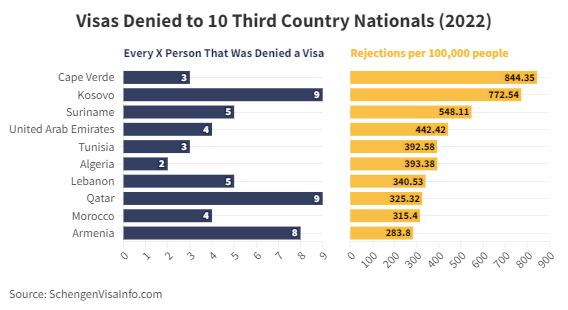As many travelers plan for foreign trips during the holiday season, one common setback they may encounter is a visa rejection, often due to errors in the visa application.
Here are some of the most common reasons for visa rejection by Tunisia, along with tips to prevent these errors and ensure a smooth Tunisia visa application process:

To enhance your chances of a successful visa application to Tunisia, it's crucial to address these common issues and provide all required documents accurately and in a timely manner. Each country may have specific requirements and considerations, so researching the specific requirements for Tunisia and consulting with the embassy or consulate can be beneficial.
A visa is an official document or endorsement that grants you permission to enter and stay in a foreign country for a specific purpose and duration. Tunisia, like many other countries, requires visas for certain nationalities to control the entry and ensure travelers meet specific requirements.
The visa requirements for Tunisia can vary depending on your nationality and the purpose of your visit. To find out if you need a visa and the specific requirements for your country, contact the Tunisian embassy or consulate in your home country or visit their official website.
Common reasons for visa rejection in Tunisia can include providing incorrect or incomplete information on the application form, not meeting financial requirements, having insufficient ties to your home country, and not providing necessary supporting documents. Refer to the list provided above for more detailed information.
To prevent visa rejection, it's important to carefully follow the visa application guidelines, provide all requested information accurately, ensure that your documents match your official records, meet financial requirements, and submit a complete application with all the required supporting documents. Applying well in advance of your travel date is also recommended.
A sponsor is an individual or entity who provides support to the visa applicant during their stay in Tunisia. Their information is crucial for officials to assess your support system and potential assistance while in the country. Providing accurate sponsor details and relevant sponsorship documents can strengthen your application.
It's generally recommended to apply for a Tunisian visa well in advance of your intended travel date. Most countries accept visa applications up to 90 days before the travel date. Applying early allows you to handle any unforeseen delays in the application process.
You can find specific visa requirements for Tunisia by visiting the official website of the Tunisian embassy or consulate in your country. They typically provide detailed information on the visa application process, required documents, and fees.
If you have a criminal record or previous visa violations in Tunisia, it's advisable to contact the Tunisian embassy or consulate to discuss your situation and understand your eligibility for a visa. You may need to provide additional documentation or explanations to address any concerns.
Travel insurance is often required for a Tunisian visa. It is essential because it provides coverage for medical emergencies, trip cancellations, and other unforeseen events during your trip, ensuring you are financially protected in case of unexpected incidents.
Yes, you can use an interpreter during the visa application process if you are not fluent in the language spoken in the host country. It's important to ensure clear communication during interviews and written correspondence. Make sure the interpreter is fluent in both your language and the language of the visa officials.
To help us improve